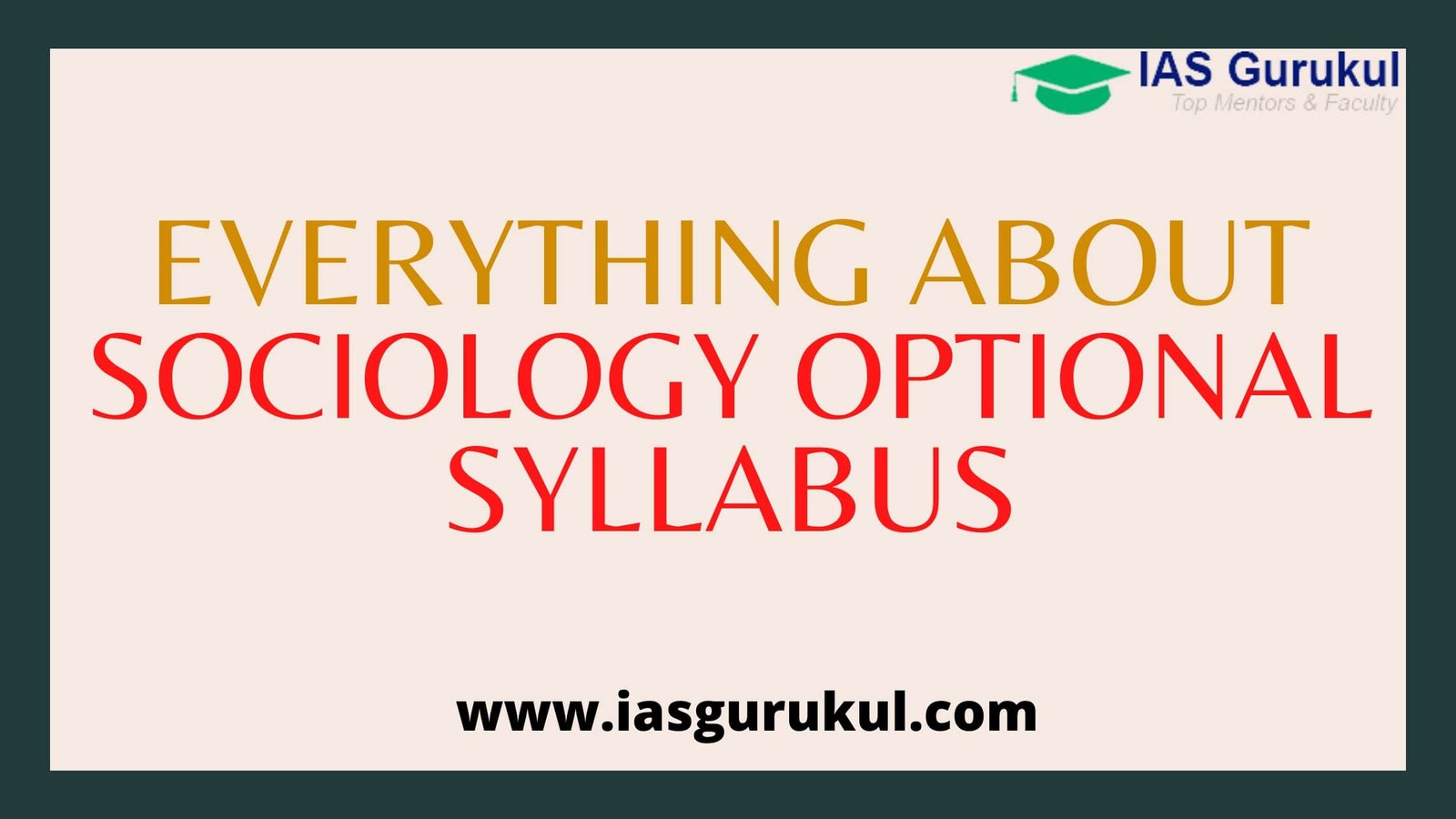
One of the reasons behind sociology being one of the most popular optionals in UPSC is that the sociology optional syllabus is comparatively less than other optional subjects and it is easier to manage it with the general studies preparation.
The beginning of preparation for sociology should likewise start with understanding the sociology optional syllabus in a comprehensive manner.
In fact it is advised for any serious candidate to first go through the entire syllabus, take out its print out and then memorize each topic in the sociology optional syllabus by heart. This will help the aspirant to relate every discussion in the IAS Gurukul class to the syllabus and thus understand its relevance.
For example, even if Pranay Sir is discussing the breakdown of marriages and increase in divorce rate in India with reference to the concept of ‘anomie’ by Durkheim of paper 1, you can still connect it to the topic of ‘systems of Kinship in India’ of Paper 2.
These inter linkages, which form the essence of answer writing in sociology, will help you score high in your optional and use it as strength.
It will also help you add on to your notes with your newspaper and magazine readings.
To download the Sociology optional syllabus in PDF as provided by the UPSC, click here: UPSC Sociology optional paper Syllabus
To understand the syllabus, continue reading.
This topic is about understanding the emergence of sociology as a reaction to modernity and social change in Europe and its comparison with other social sciences.
Sociology is also analyzed viz a viz common sense.
This topic speaks of the development of sociology as a science and the discussion around whether it should go for scientific methodology or not.
It also speaks of positivist and non positivist methodology and the debate around it.
The topic revolves around various techniques and methodologies used in sociological research.
The topic is slightly dry, but sometimes questions are asked from this area. Pranay Sir’s class notes and the IAS Gurukul printed material will suffice in preparing for this topic and there is no need to gather any further details for the same.
This forms the most important part of your sociology paper 1 syllabus or indeed the entire sociology optional syllabus.
The six thinkers, namely Marx, Durkheim, Weber, Talcott Parsons, Merton and Mead need to be understood comprehensively to master the sociology optional.
The importance of paying adequate attention in the class and understanding the essence of these thinkers cannot be stressed enough. Mugging up the notes will never help achieve a good rank in sociology. The aspirants are requested to get their doubts cleared with Pranay Sir after each class before proceeding further to get maximum benefit from the classes.
The topics deals with basic topics like poverty, inequality, exclusion from a sociological point of view, rather than a generalist perspective.
The relevance of this topic can be understood with respect to the General studies syllabus as well where this year’s economic survey has emphasized emphatically that whereas inequality is increasing, poverty is still decreasing in the country.
The sub topic of social stratification theories draws itself again from the sociological thinkers. Hence it again emphasized that concepts regarding the thinkers need to be cleared to understand these theories of stratification.
It also contains dimensions of social stratification like class, status groups, gender etc as well discussions on social mobility.
It speaks of social organization of work in different types of societies, formal and informal organization of work as well as labour and society.
Sociological theories of power are discussed.
This topic will be especially relevant in the current scenario where the definitions of democracy and citizenship are being revisited and protests and agitations are featuring in the daily news.
Religion and its relevance are explained from the sociological point of view.
The recent controversial question in General Studies with respect to secularism, which was much in news, can easily tackled by serious student of sociology with understanding of difference in secularism and secularization and its relevance in the society.
This is a relatively dynamic topic in paper 1 of sociology optional syllabus where contemporary trends with respect to family, kinship, sexual division of labor need to be discussed.
For example, the recent judgment of a court in China asking a husband to compensate his separated wife for the housework performed in the years of marriage will form a part of contemporary trends in the institution of marriage.
This again is a dynamic topic discussing the intensity of change in modern society and the agents driving it.
The paper 2 of sociology optional syllabus deals basically with the sociology of Indian society.
It starts with introducing significant thinkers like Ghurye, Srinivas and Desai who have contributed to the development of Indian sociological scenario.
The Indian colonial struggle is then discussed from sociological perspective.
The Indian society is then discussed from a micro perspective with respect to
The journey of social change in India is traced back from the making of the constitution, through the green revolution and to the development of social movements in India and beyond.
The sub topics under it include:
All these topics have current relevance and thus need to be integrated with the current scenario in the country with the help of your newspaper readings. They will also give an extra edge to your interview answers and help in an overall development of personality.